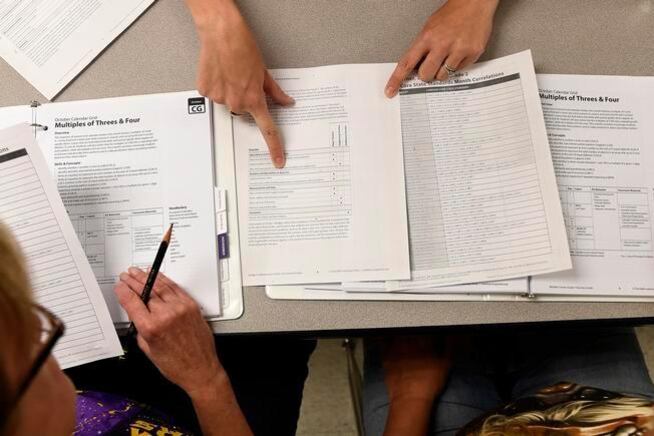A teacher at a KIPP charter school in Denver is leading a unionization push that could determine whether charter schools in Colorado are public or private employers, a key factor in whether their teachers can unionize under state law.
Cody Taffet is in his second year of teaching at KIPP Northeast Denver Leadership Academy, a charter high school in far northeast Denver. In January, after administrators abruptly changed the school’s schedule without input from teachers, Taffet filed paperwork with the National Labor Relations Board to form a union called the Colorado Charter Teachers Association.
“I was talking with some teachers and we wanted more democracy in the workplace,” said Taffet, who left a corporate job to become a teacher because he wanted to give back. “We wanted our input to be not only valued and appreciated but also considered and reckoned with.”
But the union organization effort was rejected by the regional director of the National Labor Relations Board in Denver, who found that charter schools are essentially public employers. While federal law protects the rights of private sector employees to organize unions and engage in collective bargaining, public sector education workers don’t have those rights under state law.
Now Taffet is appealing that decision to the National Labor Relations Board in Washington, D.C., which has upheld the right of charter school workers to unionize in other cases.
The outcome could open the door for charter school unions in Colorado or close off that option in a sector where educators are sometimes asked to work longer hours and often paid less than teachers at traditional public schools. The average charter school teacher salary in Denver in the 2021-22 school year was $44,475, while the average traditional public school teacher salary was $70,910, according to the Colorado Department of Education.
Charter schools have what University of Colorado Boulder law Professor Ahmed White describes as “features of both public and private entities.” All Colorado charter schools are publicly funded but privately run by nonprofit organizations. None are unionized.
An attempt last year by teachers at another Colorado charter network, New America School, failed after the charter network’s board rejected the teachers’ bid to unionize.
State labor department officials have speculated that charter schools could be seen as nonprofits that contract with the government rather than government employers. That would mean they are private sector employers.
But when the KIPP case came before Regional Director Paula S. Sawyer, she disagreed. In a dismissal decision last month, she found that charter schools in Colorado are a “political subdivision” and answer to government officials.
For example, Colorado law gives the State Board of Education the power to revoke the charter of an underperforming charter school, Sawyer wrote. She also noted that the state education commissioner can appoint and remove members of the unelected boards that govern individual charter schools and make changes to the schools’ governing documents.
Because of that, Sawyer found that charter schools are in the same category as public schools. State law says Colorado school districts don’t have to recognize teachers unions, though several dozen districts do so. A public sector collective bargaining law passed by state lawmakers last year specifically left out K-12 employees.
Private employers, on the other hand, are required to recognize unions if a majority of employees indicate they want to form one.
Taffet says KIPP feels like a private employer to him, and employees need a way to have a voice. Having to weather unilateral changes without the chance to give input is “destabilizing and demoralizing as a teacher in the building,” he said. Turnover is high, he added.
KIPP Colorado officials did not return emails and a phone call seeking comment.
Many charter leaders say collective bargaining agreements would limit their flexibility and take away from their ability to serve students.
In his request to review the dismissal, Taffet noted that charter teachers are paid by their networks. His paychecks, he said, are signed by KIPP, a nationwide network started in Texas that has 280 schools across the country, not by Denver Public Schools.
The district doesn’t control the day-to-day operations of his school, either, he said. And charter teachers like him can’t join the Denver Classroom Teachers Association.
The lack of clarity about the status of charter school employees in Colorado “creates an exploitable loophole” for employers, Taffet wrote in his request for review.
“While these entities are ultimately required to respond to the demands of the state and its authority, they are granted a unique privilege in that they are functionally inoculated from the concerns of their employees,” he wrote.
If the National Labor Relations Board under President Joe Biden agrees with him, the case could set a sort of precedent for Colorado. But White, the law professor, cautioned that the precedent would be a temporary one that future administrations could change.
“To the extent that other schools are funded and managed in an identical and very similar fashion, then it would establish an administrative precedent,” White said.
“But I say that with a caveat that the precedent established by an administrative agency at this level in particular is not really set in stone in the way precedent established by the U.S. Supreme Court would be.”
Still, Taffet has hope. He named the union the Colorado Charter Teachers Association with the thought that if his bid is successful, teachers from other charter schools could join.
“For me, personally, I’m in a place where I’m trying to be more authentic every day and use my existence to do something meaningful,” he said.
Melanie Asmar is a senior reporter for Chalkbeat Colorado, covering Denver Public Schools. Contact Melanie at masmar@chalkbeat.org.







